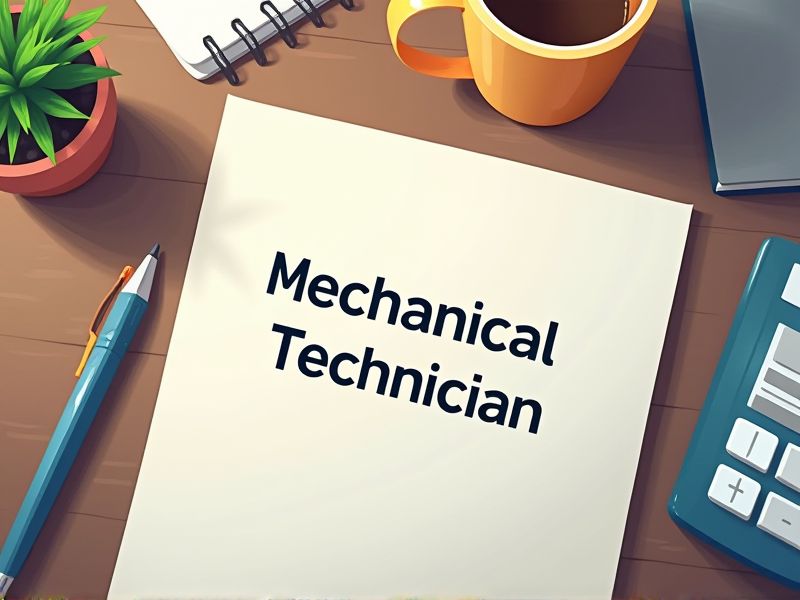
Mechanical Technicians play a crucial role in maintaining and repairing mechanical systems, requiring a precise blend of skills and knowledge. Certifications serve as verifiable proof of competence, ensuring technicians adhere to industry standards and safety regulations. This formal acknowledgment enhances credibility and broadens job prospects, reflecting a technician's commitment to professional development. Here are several key certifications that you may need as a Mechanical Technician.
Certified Maintenance & Reliability Technician (CMRT)
When a Mechanical Technician obtains CMRT certification, it indicates they have standardized skills and knowledge, improving maintenance efficiency. This leads to reduced equipment downtime, enhancing operational productivity. Organizations with CMRT-certified technicians often experience fewer breakdowns due to improved problem-solving capabilities. Employers benefit from lower maintenance costs and increased equipment lifespan through standardized practices.
National Institute for Metalworking Skills (NIMS) Certification
NIMS Certification establishes a standardized benchmark for skills and competency, ensuring that mechanical technicians meet industry-recognized performance criteria. A certified technician often sees enhanced employment prospects and mobility across different sectors as employers value the assurance of competence. Certification also encourages continuous professional development, keeping technicians abreast of new technologies and practices. It plays a vital role in maintaining safety and efficiency standards in the workplace, thereby reducing operational risks and fostering trust with employers and clients.
OSHA 10-Hour Construction Safety Certification
OSHA 10-Hour Construction Safety Certification equips mechanical technicians with essential safety knowledge, directly reducing workplace accidents and injuries. This certification fosters a culture of safety awareness, leading to more efficient work environments and fewer disruptions. Employers often mandate this certification, ensuring that their workforce complies with regulatory standards and mitigating potential legal liabilities. A well-informed technician is more likely to recognize and properly manage job-site hazards, thereby enhancing overall project safety and effectiveness.
EPA Section 608 Refrigerant Certification
The EPA Section 608 Refrigerant Certification is required for mechanical technicians to ensure they handle refrigerants responsibly, minimizing environmental harm. It mandates technicians to understand and comply with regulations aimed at reducing ozone-depleting emissions. Obtaining this certification verifies a technician's knowledge of safe refrigerant management and leakage prevention. Compliance with this requirement helps in maintaining legal standards and promotes industry best practices for environmental protection.
HVAC Excellence Certification
HVAC Excellence Certification ensures a mechanical technician possesses up-to-date knowledge and skills, aligning with industry standards. This certification enhances job prospects by verifying the technician's competency to employers. Certified technicians are often able to command higher salaries due to their proven proficiency. Certification can lead to increased job stability as employers prefer hiring individuals with validated expertise.
AWS Certified Welder Certification
The AWS Certified Welder Certification ensures mechanical technicians acquire the necessary skills to perform welding tasks with precision, thereby reducing potential errors and material waste. This certification validates a technician's ability to comply with industry standards, enhancing the overall quality of work in mechanical and industrial settings. Holding this certification often leads to increased job opportunities and higher salary potential, reflecting the demand for skilled and certified professionals. Employers gain confidence in a certified technician's capability to execute complex welding tasks safely and efficiently, minimizing liability and downtime.
Certified Machine Technician (CMT)
Certified Machine Technicians (CMT) ensure machinery operates efficiently by applying expert maintenance, reducing downtime significantly. Their specialized training in troubleshooting mechanical issues enhances productivity and minimizes costly repairs. CMT credentials provide assurance of up-to-date knowledge on industry best practices and safety standards. Companies benefit from lower operational costs due to accurate diagnostics and preventive maintenance carried out by certified professionals.
Industrial Electrician Certification
Obtaining an Industrial Electrician Certification enhances a mechanical technician's ability to diagnose and troubleshoot electrical issues, which are integral to modern industrial machinery. Complex systems increasingly incorporate electronic components, requiring technicians to possess electrical knowledge for efficient maintenance and repair. Certification ensures adherence to safety standards, reducing the risk of accidents during electrical work. Employers often seek certified individuals as they demonstrate higher competence and reliability in handling electrical systems within industrial settings.
Programmable Logic Controller (PLC) Programming Certification
Obtaining a PLC Programming Certification equips a mechanical technician with crucial skills to effectively integrate and maintain automated systems, significantly increasing system reliability and operational efficiency. With industries increasingly relying on automation, technicians with PLC knowledge can troubleshoot and resolve issues faster, minimizing downtime. Certified technicians often gain access to higher-paying job opportunities as they provide enhanced value through their specialized skill set. Employers prefer certified professionals because they demonstrate a verified understanding of complex automation processes critical for modern mechanical operations.
Six Sigma Yellow Belt Certification
Mechanical Technicians seeking Six Sigma Yellow Belt Certification improve their problem-solving skills, allowing for more efficient troubleshooting and less downtime. The certification provides a foundational understanding of process improvement methodologies, directly enhancing quality control in mechanical operations. As a result of this training, technicians contribute to cost savings and increased operational efficiency within their teams. Organizations benefit from the enhanced productivity and reduced waste, leading to a stronger competitive position in the market.
Summary
With certifications, you can enhance your skills and demonstrate your expertise, leading to better job opportunities. Employers often prioritize certified candidates, which can increase your chances for advancement. Certifications may lead to higher salaries due to recognized proficiency in specialized areas. Finally, your credibility and professional reputation can improve significantly, fostering trust with peers and supervisors.
